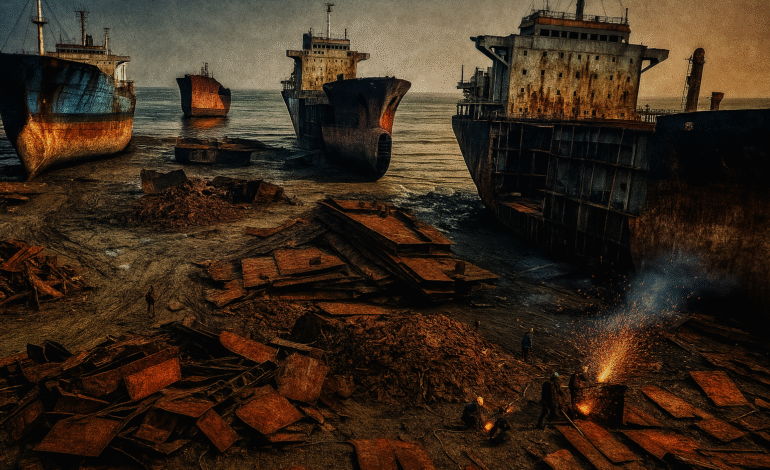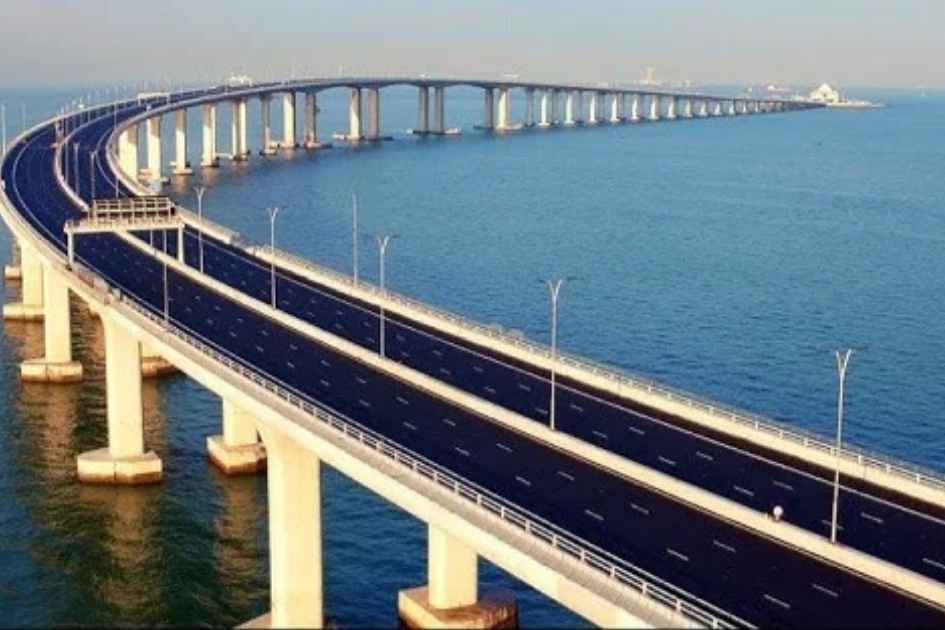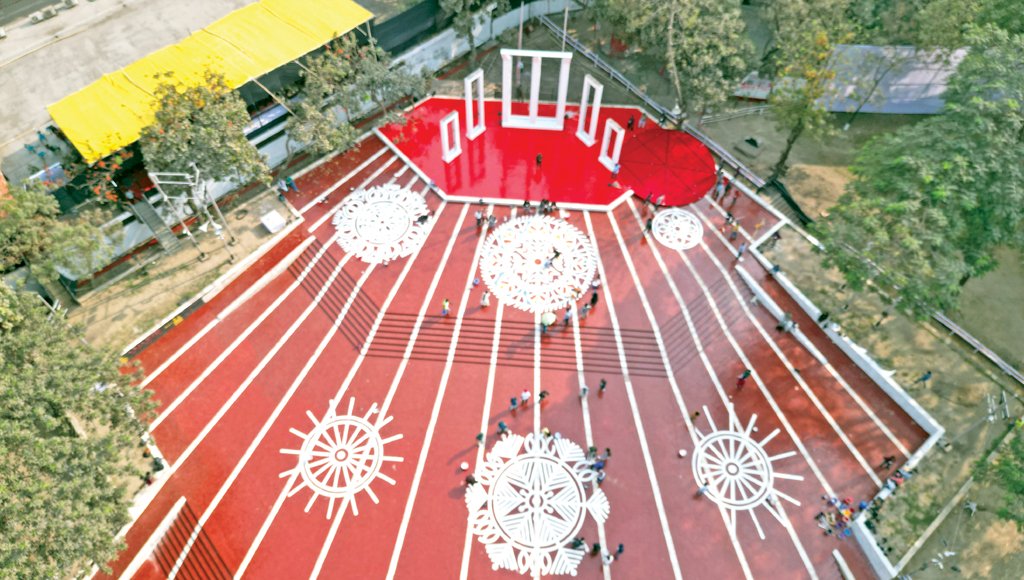Shipbreaking in Bangladesh: Rust to Riches Debate

Shipbreaking in Bangladesh and Its Rising Debate
Shipbreaking in Bangladesh has become one of the most controversial yet profitable industries in South Asia. Every year, dozens of giant ships from around the world end their journeys on the beaches of Chattogram. Here, they are dismantled for steel and spare parts, fueling Bangladesh’s construction boom and heavy industries.
The debate over shipbreaking in Bangladesh has only grown louder. Supporters argue it brings jobs, steel, and foreign currency. Critics point to dangerous working conditions, low wages, and environmental destruction. The question remains: who truly profits from shipbreaking in Bangladesh?
The Economic Backbone of Shipbreaking in Bangladesh
Shipbreaking in Bangladesh contributes billions to the economy. Nearly 60 percent of the country’s steel supply comes directly from dismantled ships. Local construction companies rely heavily on this recycled steel to build bridges, high-rise buildings, and factories.
The industry also saves Bangladesh from costly steel imports. According to The World Bank, ship recycling reduces dependency on imported raw materials, boosting local self-sufficiency. For policymakers, this makes shipbreaking in Bangladesh an economic necessity despite its controversies.
Who Gains the Most from Shipbreaking in Bangladesh?
The biggest beneficiaries are the shipyard owners. These powerful business families purchase old vessels cheaply from global shipping companies, then sell the steel and parts at huge profits. The demand for recycled steel in construction ensures a steady flow of income for them.
Traders and middlemen also benefit. Spare engines, cables, and furniture stripped from ships find their way into local markets, making secondhand items affordable. Bangladesh Steel Re-Rolling Mills and similar companies buy massive amounts of scrap metal, feeding the domestic steel industry.
For them, shipbreaking in Bangladesh means profit margins unmatched by other industries.
Workers and Wages: The Dark Side of Shipbreaking in Bangladesh
While owners profit, workers often face a grim reality. Laborers, many of them from rural villages, earn only a fraction of the wealth generated. Daily wages average 500–700 taka, which is meager compared to the risks.
Shipbreaking in Bangladesh is one of the world’s most dangerous jobs. Workers cut through heavy steel with little protection, exposed to toxic substances like asbestos and oil sludge. The International Labour Organization has repeatedly flagged safety standards in Bangladesh’s shipyards as inadequate.
In this equation, it is clear that the labor force gains the least from the industry.
Environmental Cost of Shipbreaking in Bangladesh
The beaches of Chattogram are now littered with oil spills, rust, and toxic residues. Environmental groups such as Shipbreaking Platform have documented how the coastline suffers severe pollution. Marine life is being destroyed, while nearby communities report rising health issues linked to contamination.
Despite this, environmental regulations are weakly enforced. Owners cut costs by ignoring proper waste management. Shipbreaking in Bangladesh, therefore, profits the few while damaging the environment for many.
Shipbreaking Supply Chain: From Beach to Building
The journey of a ship in Bangladesh is fascinating. Once beached, workers strip it piece by piece. The steel goes to re-rolling mills, where it is processed into rods and beams. These materials then end up in Dhaka’s construction sites or in factories producing infrastructure for export.
Furniture, tools, and electronics removed from ships are sold in secondhand markets, creating small-scale businesses. Even the smallest nuts and bolts are reused. Shipbreaking in Bangladesh thus creates an entire ecosystem of commerce, stretching from the beaches of Chattogram to households across the country.
Government Policy and Regulation
The government views shipbreaking in Bangladesh as vital for the economy. It brings tax revenue, foreign currency savings, and jobs. However, international pressure has forced Dhaka to promise reforms.
Bangladesh is a signatory to the Hong Kong Convention for Ship Recycling, which aims to improve safety and environmental standards. Implementation, however, remains slow. Critics argue that without strict regulation, the industry will remain exploitative and harmful.
The Global Context of Shipbreaking in Bangladesh
Bangladesh is not alone in this trade. India, Pakistan, and Turkey are also major shipbreaking nations. However, Bangladesh dominates due to its long shallow beaches, cheap labor, and weaker regulations.
Global shipping companies send their old vessels to Bangladesh precisely because dismantling costs are low here. In effect, shipbreaking in Bangladesh becomes a dumping ground for the developed world’s waste, while profits flow to a few.
The Social Debate: Profit vs. People
Supporters of shipbreaking in Bangladesh argue it has uplifted rural workers by providing jobs in an otherwise struggling economy. They claim without this industry, unemployment would rise, and steel prices would skyrocket.
Opponents counter that jobs without safety, dignity, or fair wages are exploitation. They believe profits are concentrated in the hands of a few, while the majority suffer health and environmental risks.
This tug-of-war between economic gain and human cost defines the future of shipbreaking in Bangladesh.
Future Outlook: Can Shipbreaking in Bangladesh Be Sustainable?
Experts suggest Bangladesh can still profit while improving conditions. Investment in modern technology, proper waste disposal, and safety equipment could make the industry safer. International buyers increasingly demand eco-friendly practices, meaning sustainable reforms might also secure more business.
Bangladesh’s youth and activists are demanding accountability. They argue that real progress will come only when shipbreaking in Bangladesh values workers and the environment as much as profits.
Health Risks Beyond the Shipyard
Shipbreaking in Bangladesh does not just harm workers inside the yards. Toxic waste often ends up in nearby villages. People living close to shipbreaking zones report breathing problems, skin diseases, and stomach illnesses. Children are particularly vulnerable as contaminated water flows into rivers used for daily needs. Long exposure to asbestos and heavy metals increases the risk of cancer and long-term health issues.
The Future of Shipbreaking in Bangladesh
Despite the risks, shipbreaking in Bangladesh has huge potential if modernized. With better technology, stricter safety standards, and eco-friendly recycling, the industry could create safer jobs while protecting the environment. The global demand for recycled steel will only grow. If Bangladesh reforms its shipbreaking practices, it can become a world leader in sustainable ship recycling rather than being seen as a dangerous shortcut for global shipping companies.







